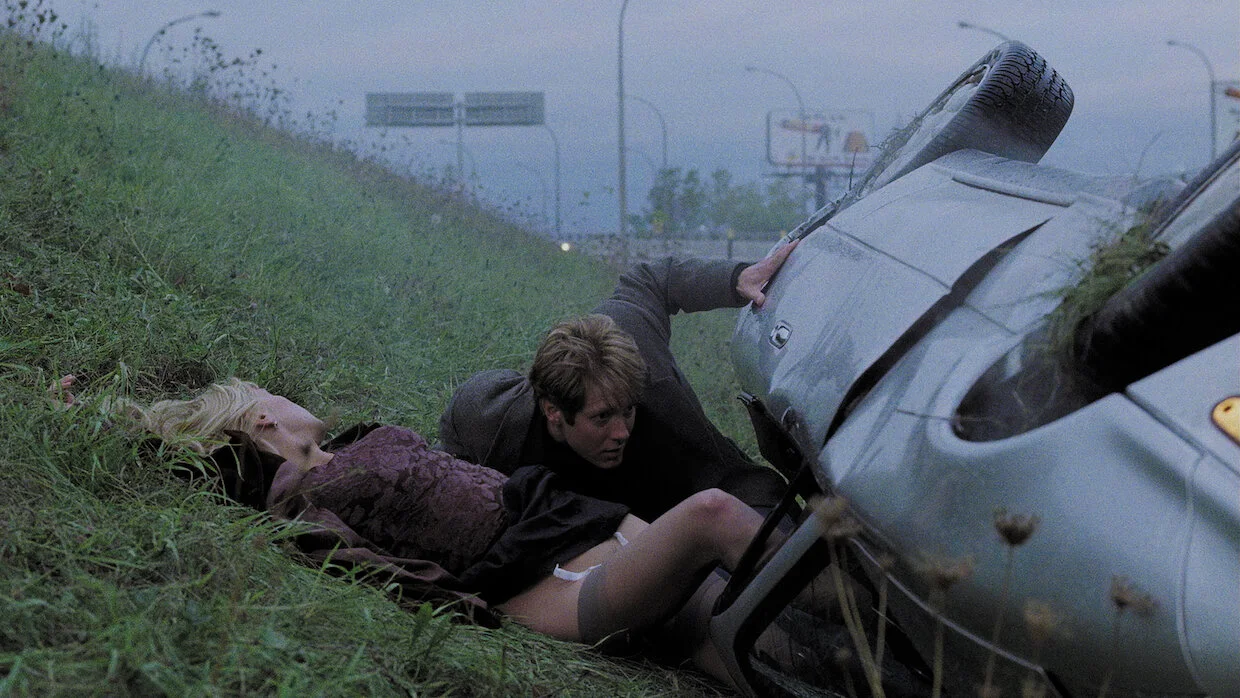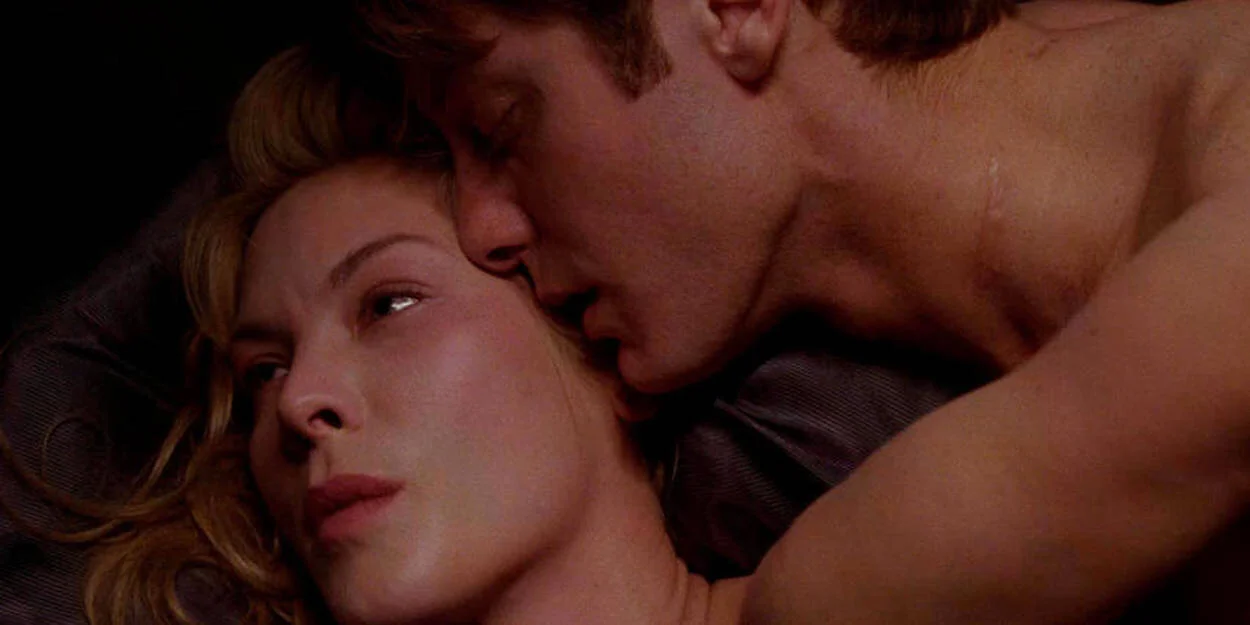[Editorial] Is David Cronenberg’s Crash Controversial Just For The Sake Of It?
Personally I have always had an affliction towards films that are shattered with controversy and the means to create a riot, however there is a constant argument surrounding films that have been created solely for the purpose of causing said controversy. Should we really see films exist if all they were created to do was be different from anything out there and get people talking? Most of the time I would completely agree with this sentiment, and even go as far to actively promote the creation of films in this vein, yet after watching David Cronenberg’s 1996 erotic psychological film, Crash, there was dizzying confusion that seemed to penetrate my mind, leaving me asking the question of ‘Why?’...
Crash tailgates James (James Spader) as he drives further and further into his erotic fascination with automobiles, and more primarily the act of motoring accidents. He is already in an explicitly open marriage with his wife Catherine (Deborah Kara Ungah) which permits both of them to freely explore their deviant sexual natures and find pleasure, and eventually pain, with anyone that takes their fancy. After being involved in a severe traffic accident and witnessing a man die in his passenger seat, James becomes dangerously obsessed with car crashes and becomes involved with a group of symphorophiliacs, who are people that are sexually aroused by disasters - in this case, that happens to be disasters involving automobiles. With the risks high and the orgasms intense, it is not long before the real consequences come crashing through their lives.
On first interception it seemed like Crash was going to be the type of film that would adhere to my personal tastes; it is directed by Cronenberg, it is steeped in controversy, it is erotic by nature and it features some gruesome elements to it. I couldn’t see that there would be any way that this wouldn’t be a film that would immediately fall into my ‘Films Made for Me’ category, but I couldn’t have been more wrong. From the very beginning the film, everything felt as if it were forced and needed so desperately to be highly controversial and unique to anything anyone has ever made before. Admittedly, it does exhibit uniqueness, but that award actually goes to author J.G. Ballard as the film is a screen adaptation of his 1973 novel of the same name. Without having read the source material (something I will commit myself to) there are some aspects that may not solely be down to how Cronenberg presented the film on screen, for instance the dialogue.
The first aspect that felt as it it were trying to cause notoriety was how the language between the characters was delivered, especially during the sex scenes. Perhaps this is a reflection on my sexual nature and experiences, rather than the script, but it felt as if some of the lines were designed to ensure the audience felt it was controversial with one particular exchange between Catherine and James feeling completely crude, with Catherine asking a multitude of questions as James penetrates her from behind.
‘Have you seen his penis?’
‘Can you imagine what his anus is like?’
‘Have you ever tasted semen? Some semen is saltier than others.’
There was nothing erotic or exciting about what she was saying, it merely felt like dialogue included to be perceived as provocative, and in some ways you could argue that it does come across that way, however, in other ways it just seems like a lazy attempt at trying to get the audience to feel shocked. This use of overtly sexual prose, which is so direct and to the point, reminded me of the types of things teenage boys would say at school just to get a reaction out of whoever was around them, a childish and cheap way to quickly rouse an audience and evoke a reaction without really having to do much. As mentioned, perhaps this is a reflection on my personal preferences, but watching these exchanges felt incredibly crude, and forceful in its attempt to be something more shocking than it truly was.
Then we come further into the group of symphorophiliacs, who in their own way cause controversy and provide the film with its most out there aspects. Vaughan (Elias Koteas), Helen (Holly Hunter) and Gabrielle (Rosanna Arquette) become the other key characters to this story, with James becoming sexually involved with all three of them due to their erotic fascination with motoring accidents. Together they explore their fantasies and turn them into a reality, blurring the lines between how far we should indulge and at what point we should stop. Arguably their sexual obsession with motoring accidents is a righteous point of controversy; it is not the most conventional attraction and due to its often grisly nature, can be seen as something exceptionally distressing to have a sexual lust for. It does open up questions shrouding the human fascination with the morbid - the majority of us slow down and stare at motoring accidents, taking an extra moment to dart our eyes around the scene in order to obtain any gruesome details which we will go on to state that we didn’t want to witness. Therefore Crash does portray a message about the macabre nature of humans, but the film decides to take that element to the extreme and show it in a much more exacerbated presentation. Some might also argue that it is exploitative to those that have a sexual attraction for motoring vehicles - there are people out there who are more than happy making love to a stationary car, yet have no desire to witness car crashes and the demise of others to get their needs satisfied. At times throughout the film it does feel as though it was less about the deeper messages, and more about the ‘How can we make this really shocking?’ discussion, and of course causing horrific car crashes and then wanting to masturbate or fuck in the wreckage, is always going to cause the audience to drop their jaw and gasp at what is deemed an inhuman act of selfishness and sexual self absorption.
There are underlying messages here about how the element of risk can increase our sexual pleasure and the intensity of danger often means a more ferocious orgasm will come shortly after, but does Crash really ride the actualities of risk and sex or does it merely try to present something that will just get people talking because it is so out there compared to other films? It certainly got people talking when it was released, and was subject to censorship, cuts and even banned in certain countries for being so controversial, which was thanks to depictions of sexual acts coupled with violence - something that the officials never are fond of. When going into Crash there was something more I was expecting from the film - if it really were one of the most controversial films ever made, then I expected to see more graphic sexual acts, more horrific car accidents, more penetration of leg wounds, more of the controversy the film is so desperate to exude. Yet it seems to fall a little short and miss the mark, instead feeling like it was created by someone who didn’t quite want to create something that was exceptionally shocking and controversial, but did quite want it to have enough sex and weirdness that it got people talking about the film.
So is David Cronenberg’s Crash controversial just for the sake of it? The majority of the film certainly comes across that way, and perhaps could have felt truly like a masterpiece in controversy if it had put itself into fifth gear, put the pedal to the floor and pushed even further into its disturbing elements. Why put the handbrake on where it did? Why not be legitimately controversial and delve into the seedier side of this underground world full of vehicle fetishes? There could have also been a more concentrated focus on making this an erotic and sexual film, one that aroused the audience and heightened their senses, to leave the audience feel confused and ashamed that they too were feeling sexually awakened during watching a gory on-screen car crash. But nothing in Crash ever feels truly erotic - the dialogue is tame and robotic, the sex throughout is autonomous and doesn’t fill the screen with fumes of passion. With its need to be contentious, yet its reluctance to fully embrace the shocking territory it does feel like Crash tries to be controversial for the sake of it, but even then doesn’t really pass the test.





![[Editorial] 8 Mind Horror Short films](https://images.squarespace-cdn.com/content/v1/5fe76a518d20536a3fbd7246/1693504844681-VPU4QKVYC159AA81EPOW/Screenshot+2023-08-31+at+19.00.36.png)
![[Editorial] If Looks Could Kill: Tom Savini’s Practical Effects in Maniac (1980)](https://images.squarespace-cdn.com/content/v1/5fe76a518d20536a3fbd7246/1694952175495-WTKWRE3TYDARDJCJBO9V/Screenshot+2023-09-17+at+12.57.55.png)
![[Editorial] Eat Shit and Die: Watching The Human Centipede (2009) in Post-Roe America ](https://images.squarespace-cdn.com/content/v1/5fe76a518d20536a3fbd7246/1691245606758-4W9NZWE9VZPRV697KH5U/human_centipede_first_sequence.original.jpg)
![[Editorial] Top 15 Female-Focused Mind Horror Films](https://images.squarespace-cdn.com/content/v1/5fe76a518d20536a3fbd7246/1691247166903-S47IBEG7M69QXXGDCJBO/Image+5.jpg)
![[Editorial] Deeper Cuts: 13 Non-Typical Slashers](https://images.squarespace-cdn.com/content/v1/5fe76a518d20536a3fbd7246/1694951568990-C37K3Z3TZ5SZFIF7GCGY/Curtains-1983-Lesleh-Donaldson.jpg)
![[Editorial] 5 Slasher Short Horror Films](https://images.squarespace-cdn.com/content/v1/5fe76a518d20536a3fbd7246/1696358009946-N8MEV989O1PAHUYYMAWK/Screenshot+2023-10-03+at+19.33.19.png)
![[Editorial] 8 Body Horror Short films](https://images.squarespace-cdn.com/content/v1/5fe76a518d20536a3fbd7246/1690838270920-HWA5RSA57QYXJ5Y8RT2X/Screenshot+2023-07-31+at+22.16.28.png)
![[Ghouls Podcast] Maniac (2012) with Zoë Rose Smith and Iona Smith](https://images.squarespace-cdn.com/content/v1/5fe76a518d20536a3fbd7246/1696356006789-NYTG9N3IXCW9ZTIJPLX2/maniac.jpg)
![[Editorial] “I control my life, not you!”: Living with Generalised Anxiety Disorder and the catharsis of the Final Destination franchise](https://images.squarespace-cdn.com/content/v1/5fe76a518d20536a3fbd7246/1696444478023-O3UXJCSZ4STJOH61TKNG/Screenshot+2023-10-04+at+19.30.37.png)













![[Book Review] The Book of Queer Saints Volume II (2023)](https://images.squarespace-cdn.com/content/v1/5fe76a518d20536a3fbd7246/1697187383073-U78VOF5WVDHI9YE8M98A/Screenshot+2023-10-13+at+09.52.31.png)
![[Event Review] Highlights from Mayhem Film Festival 2023](https://images.squarespace-cdn.com/content/v1/5fe76a518d20536a3fbd7246/1697624582491-MPT2VB9RRGU6OG7L6UKL/Mayhem+2023.jpg)
![[Editorial] Mayhem Festival: Interview with Thomas Sainsbury on Loop Track (2023)](https://images.squarespace-cdn.com/content/v1/5fe76a518d20536a3fbd7246/1697186472899-WC4RR0TW7L7LMFEBGPA2/Tom+Sainsbury.jpg)
![[Film Review] Sympathy for the Devil (2023)](https://images.squarespace-cdn.com/content/v1/5fe76a518d20536a3fbd7246/1697186986143-QDVLQZH6517LLST682T8/Screenshot+2023-10-13+at+09.48.52.png)
![[Film Review] V/H/S/85 (2023)](https://images.squarespace-cdn.com/content/v1/5fe76a518d20536a3fbd7246/1697455043249-K64FG0QFAFVOMFHFSECM/MV5BMDVkYmNlNDMtNGQwMS00OThjLTlhZjctZWQ5MzFkZWQxNjY3XkEyXkFqcGdeQXVyMTUzMTg2ODkz._V1_.jpg)
![[Event Review] Saw the Musical: The Unauthorized Parody (2023)](https://images.squarespace-cdn.com/content/v1/5fe76a518d20536a3fbd7246/1697187791989-OYMGLZO193B7XEMTJYGR/Screenshot+2023-10-13+at+10.01.44.png)
![[Editorial] Soho Horror Film Festival: Interview with Aimee Kuge on Cannibal Mukbang](https://images.squarespace-cdn.com/content/v1/5fe76a518d20536a3fbd7246/1701808004722-9M8SZ2UXY52QBQBR4NTI/img20230818_15150780.JPG)
![[Editorial] 10 Films & Events to Catch at Soho Horror Film Fest 2023](https://images.squarespace-cdn.com/content/v1/5fe76a518d20536a3fbd7246/1700819417135-299R7L4P0B676AD3RO1X/Screenshot+2023-11-24+at+09.41.52.png)
![[Editorial] 9 Horror Nintendo Switch Games To Play](https://images.squarespace-cdn.com/content/v1/5fe76a518d20536a3fbd7246/1697214470057-3XZXX8N4LYIMDFWS6Z3P/Screenshot+2023-10-13+at+17.20.13.png)
![[Mother of Fears] Mothering in Silence in A Quiet Place (2018)](https://images.squarespace-cdn.com/content/v1/5fe76a518d20536a3fbd7246/1696445921315-HZJ2DZYQIH6VVWXBO2YL/Screenshot+2023-10-04+at+19.52.29.png)
Even though they are not to my personal liking, there is no denying that slasher films have been an important basis for the horror genre, and helped to build the foundations for other sub-genres throughout the years.